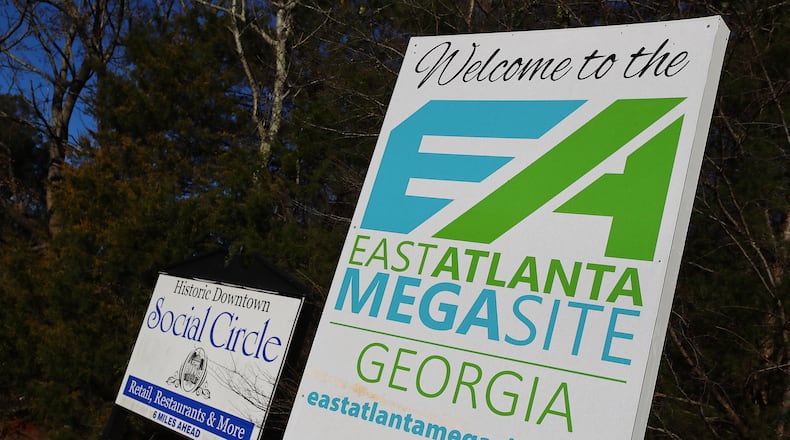The biggest economic development project in Georgia history is about to be built on a rural tract of land about an hour’s drive east of Atlanta.
Among local authorities, no one may have been more important in bringing Rivian’s planned $5 billion plant to the state than Alan Verner.
His twin roles as a prominent public official and a large landowner raise conflict of interest questions about the massive electric vehicle factory deal, which was brokered by state and local authorities in secrecy.
Verner and his four siblings own about 675 acres of property earmarked for the Rivian plant, or a third of the 1,978-acre site in Morgan and Walton counties. The siblings could pocket more than $20 million combined, based on a nearby land deal.
Talks to sell the land began in early 2021, while Verner was chairman of the Joint Development Authority of Jasper, Morgan, Newton and Walton Counties, a position he didn’t vacate until last August.
Wilson DuBose, Verner’s attorney, and Shane Short, who helped steer the JDA as the Rivian deal was negotiated, say Verner took all the necessary steps to avoid a conflict of interest, including abstaining from votes on Rivian and leaving the room when the board discussed Rivian. Ben Sheidler, a JDA spokesman, said Verner “did not receive any preference or advantage” in selling his land.
Pat Wilson, commissioner of the state Department of Economic Development, says it’s extremely unlikely Verner could have influenced Rivian’s decision to choose the site. A spokesperson at California-based Rivian said the EV maker relied on conversations with the state and “to the best of our knowledge, no one at Rivian has directly interacted with the Verner family.”
Credit: contributed/Morgan County Citizen
Credit: contributed/Morgan County Citizen
But ethics experts say Verner’s roles as an economic development recruiter and property seller highlight the weakness of Georgia’s conflict of interest laws involving public officials.
Georgia state law allows development authorities to conduct transactions with its board members, like in many other states. Critics say the law should be tightened.
“I have a huge problem that someone served in this position and they’re essentially profiting from it,” said William Perry, founder of Georgia Ethics Watchdogs, a nonprofit.
Local opponents of the Rivian project, located between the communities of Social Circle and Rutledge, question whether a massive automotive factory is appropriate for the rural area. And many residents have complained about being left in the dark while the project was being negotiated.
After the plant project was confirmed in December, residents at a community meeting in January asked the JDA what steps were taken to prevent conflicts around Verner’s property sale. When the JDA’s Short told them Verner left the room when Rivian was discussed, many responded with sarcastic laughter.
Some residents have since raised a legal fund to challenge the Rivian plant on environmental grounds. But local opponents lost clout when the state took control of the project last month, eliminating the need for zoning approvals that required public votes.
Construction at the site is expected to begin by this summer. Georgia has yet to disclose the financial incentives it promised Rivian, but it is expected to total hundreds of millions or even billions of dollars.
Credit: ArLuther Lee
Credit: ArLuther Lee
Cox Enterprises, owner of The Atlanta Journal-Constitution, owns a 4.7% stake in Rivian and supplies services to Rivian. Sandy Schwartz, a Cox executive who oversees the AJC, is on Rivian’s board of directors and holds stock personally. He does not take part in the AJC’s coverage of Rivian.
Verner declined to be interviewed for this article. Instead, Verner’s attorney responded to questions on his behalf. Verner’s siblings did not respond to requests for comment.
Verner kept public post while land sale discussed
The Verners have long been prominent members of Rutledge’s tiny community, farming local land for more than a century. Henry Verner, Alan’s father, was known for handing out peppermint candy to anyone he met, and for opposing the installation of bright lighting along I-20 just south of his property, said Rutledge resident JoEllen Artz, who opposes the Rivian plant.
The land was divided among the children after Henry Verner’s death in 2007. Alan Verner sold his livestock and farming equipment in 2017 and ceased all farming options in 2019, DuBose said.
Over a bit more than two decades, Alan Verner became a major architect of the area’s economic development. He joined the board of the four-county JDA when it was created in 1999, becoming chairman in 2006. JDA board members are appointed by county commissioners. Verner’s position was unpaid.
The JDA, under Verner’s watch, developed the 1,000-acre industrial park known as Stanton Springs. Located just south of I-20, across the highway from Verner Farms, the park’s tenants include the pharmaceutical company Takeda and social media giant Facebook.
The project helped earn the JDA a reputation as one of the most aggressive and successful development authorities in Georgia. When Verner announced his retirement last year, he told the JDA board, “Stanton Springs, it’s my baby,” according to the Morgan County Citizen.
Credit: Curtis Compton / Curtis.Compton@
Credit: Curtis Compton / Curtis.Compton@
In 2018, the state of Georgia began marketing the East Atlanta Megasite north of I-20, on land abutting Verner family properties. It became one of three such megasites in Georgia, along with ones in Bryan County and Peach County, that had enough land for state development authorities to pitch to big business recruits.
In the fall of 2020, Rivian contacted Georgia’s Department of Economic Development about potentially building a factory in the state, one of nine states Rivian was considering, according to Wilson.
In early February of last year, the JDA contacted the Verner siblings, including Alan, about selling their property for a potential electric vehicle manufacturing project, without naming Rivian, Sheidler said.
Verner continued in his role as JDA chairman for several more months, until resigning late last August, when talks between Georgia and Rivian were very well advanced.
In February of 2021, Verner abstained from voting to approve the executive session minutes from three previous JDA meetings. From that point until August, he abstained from voting on six additional occasions. Verner also left the room during JDA meetings on at least two occasions, once in February and once in April, according to JDA documents.
“It honestly offends me to hear people say that Verner had something to do with personally assisting himself to profit from this venture,” said Short, director of the Development Authority of Walton County.
In May of 2021, the JDA bought about 665 acres of the East Atlanta Megasite. It says it purchased the land to build a frontage road and for future economic development, but not specifically for Rivian.
To amass enough land for Rivian’s roughly 2,000-acre planned site, the JDA would have to negotiate additional purchases with neighboring landowners like the Verners.
The JDA holds options to purchase the Verners’ properties, before the land can be leased to Rivian, but financial details have not been disclosed. Of the roughly 675 acres of Verner family land, Alan Verner and his wife own about 188 acres.
Some local residents aren’t satisfied with what they’ve been told.
“I have no ill feelings toward the Verners,” Artz said. “I’d love to come into that kind of money myself. But this was just not done the right way.”
--This article has been updated to include additional details from the JDA about its initial purchase of land at the East Atlanta Megasite.
About the Author
Keep Reading
The Latest
Featured






